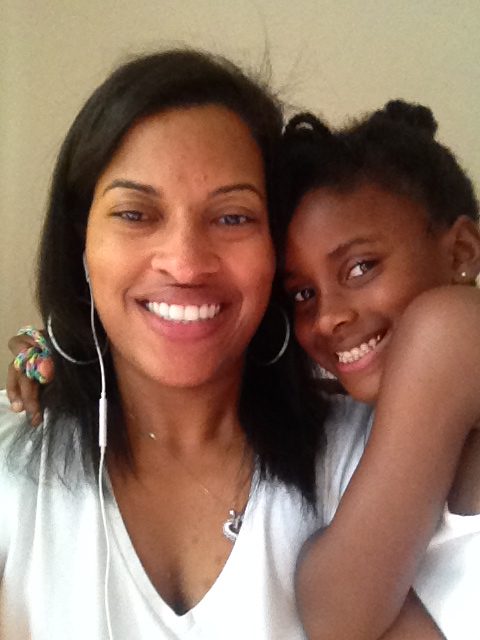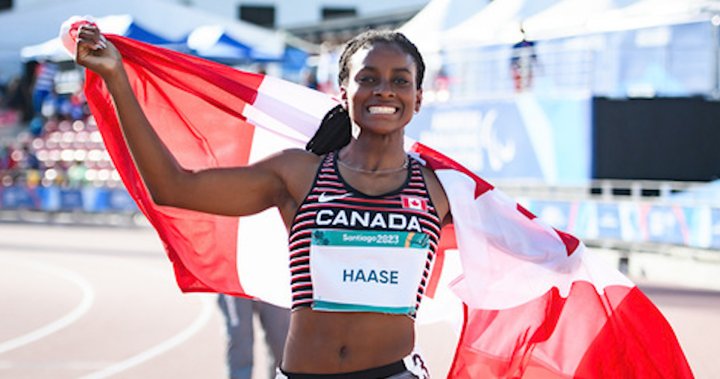As she crossed the finish line during the 200 metres at the Parapan American Games in Santiago, Chile, in November, Toronto teenager Sheriauna Haase remembers how she felt.
“In my head I was trying to play it cool but there’s no reason to. I just won a bronze medal and it was just insane.”
Make that two bronze medals. She had won one each in the 100 m and 200 m — an impressive showing for the teenager who only started training a year ago.
And it’s not just running, Haase is a triple threat: a world class athlete, dancer and actress. She’s also an ambassador for Holland Bloorview Children’s Rehabilitation Hospital.
She hopes to be an inspiration to others that anything is possible.
Overcoming hurdles
Born with a congenital limb reduction, Haase navigated the complexities of her early years, facing childhood bullying as one of the hurdles along her path.
“The curiosity became negative in a way,” said Haase, by others staring or making hurtful comments. “But then when I went to public school … it just got really bad and then I was like, ‘Oh, well, this must not be good about me.’”
A young Sheriauna.
Courtesy: Sherylee Honeyghan
Despite the initial struggles, Haase found solace and strength in the unwavering support of her family, especially her mother. “(My family) would just always lift me up and they would always tell me that I’m beautiful and there’s nothing wrong with me.”
Her family’s support helped her build confidence.
“I love my arm,” Haase said while smiling. “It’s so cute and little.”
The power of family
Her family connection and support is strong. Her mother’s intuition started before Haase was even born.
When Haase’s mother Sherylee Honeyghan was pregnant with her daughter, she went for a standard 20-week scan. It was a Friday.
“And [over] the weekend I had a thought, ‘What would I do if I had a child that was born without a left hand?’” Honeyghan recalls. “Don’t ask me how that came into my head, but I kind of tried to shoo it away — ‘it’s negative thoughts, it’ll be fine’ — and then Monday, I got the call.”
When Honeyghan got to the doctor’s office, they told her the scan showed Sheriauna didn’t have the development of her left hand.
Initially, there was shock and devastation, especially in a world that can be cruel. But Honeyghan refused to let her daughter’s narrative be dictated by what society might deem acceptable. As long as her daughter was happy and healthy then that was what mattered.
Sherylee (L) and Sheriauna (R).
Courtesy: Sherylee Honeyghan
“When she was born … I was so thankful that she was healthy,” said Honeyghan, who recalls how she then began thinking next steps. “Like, where do we go from here? And how do we support her and make sure that she has like all of the best things that she can have?”
Challenges become possibilities
Honeyghan said it was important for her daughter to know from a young age that she may have been born differently, but that she was still able to do anything she wanted.
“It was about understanding, for me, how to support her through those challenges,” Honeyghan said. “This is who you are. This is how you were born. And you need to embrace that and understand that you have abilities.”
Honeyghan even turned those challenges into opportunities, by writing a book about her daughter titled We Are Beautiful, a testament to the family’s commitment to spreading a message of inclusivity. The book not only showcases Haase’s unique beauty but also serves as a tool for educating families, parents, children, educators, and students about embracing differences.
Books from the ‘I Am Sheriauna’ series, penned by Sherylee.
Global News
As Haase grew older, becoming more confident in herself and her abilities, the bond between her parents, especially her mother, became a cornerstone of Haase’s resilience. Honeyghan played a pivotal role in shaping Haase’s self-perception, instilling confidence and reinforcing the idea that uniqueness is a source of strength.
Sheriauna holding the book her mother wrote.
Courtesy: Sherylee Honeyghan
Bonding moments
The duo often engages in shared activities that go beyond the surface — doing Haase’s hair.
Hair, for many Black women, holds cultural and personal significance, and can often be a big bonding moment between mother and daughter. And though Haase has found modifications on how to navigate her everyday life, her hair is still one of the few things she needs assistance with.
Sherylee helping her daughter, Sheriauna, with her edges.
Global News
“I know for a lot of other Black women, our hair is kind of just part of our identity. It’s just so important to me because I love doing so many different things with my hair and I always wanted to look good just like everybody else,” said Haase, discussing how for many Black women, hair needs a bit more tender, love and care due to its texture.
Sherylee helping her daughter, Sheriauna, with her hair.
Global News
In this intimate process, Honeyghan became not just a hairstylist but a confidante, creating a space for laughter and shared moments. “It is a bonding moment. We usually watch TV shows or we just talk about each other’s days and stuff we love. Like I love laughing with my mom,” Haase said.
“She sees how happy I am, then I see that she’s happy that I’m happy. It just makes it really special.”
The rhythmic heartbeat of her journey
Dancing has been a constant in Sheriauna’s life since the age of two, adding another layer to her multifaceted identity. Her passion for dance, coupled with an emerging interest in acting, propelled her to new heights, including a role in the popular TV shows Circuit Breakers and The Next Step.
Dance is more than a form of expression for Haase; it is the rhythmic heartbeat of her journey, intertwining seamlessly with the chapters of her life. From the tender age of two, Haase found herself immersed in the world of dance, discovering the joy of movement and the power of self-expression.
Her passion for dance became a cornerstone of her identity, a celebration of her uniqueness that echoed through each graceful step.
Sheriauna posing for a dance photo.
“I’m so grateful that dancing has been a part of my life for this long,” Haase said. “And acting as well is also something that I’ve always wanted to do … so I’m very, very grateful for that.”
Quick to learn — and fast to run
But Haase isn’t just a talented dancer and actor — she’s also a medal-winning track star.
Haase’s transition from the dance floor to the track is a testament to Bob Westman’s adaptive coaching style. Westman is the lead para coach (east) for Athletics Canada.
Westman has more than a decade of coaching Olympic and Paralympic athletes, and he’s impressed by Sheriauna’s focus, drive and maturity.
“I had to be very careful as a coach that anything I was teaching her was done right the first time because she was going to do it right, whatever she was taught,” Westman recalls. “Her development from week to week to month to month was just amazing, incredibly fast.”
Coach Bob Westman (L) and Sheriauna (R) posing with her bronze medal.
Courtesy: Bob Westman
In fact, Haase began training for the Parapan American Games in September. Two months later, she won those two bronze medals.
The unison of Sheriauna’s passions — acting, dancing, and track and field — creates a unique tapestry that captivates everyone she meets. Westman envisions a future in which Sheriauna becomes a household name, not just for her athletic prowess but for her charisma and love for life.
“When you meet her, you just know she has a charisma that catches on, and a love for life that you just want to be around all the time,” Westman states. “It doesn’t matter what pathway she picks; she’s just going to be incredible at it.”
World Para Athletics Championships, Paris 2023. July 10 2023. Sheriauna Haase 100m (T47) heats.
Yonathan Kellerman Photography
Haase’s story extends beyond the track — it’s a narrative of courage, ambition, and the pursuit of dreams. Her coach envisions a future where she becomes a world champion, and while Haase embraces these aspirations, she remains a source of inspiration to those she encounters.
“Just keep watching because you’re going to see a lot of her,” Westman declared. “She’s a very bright light.”
Dedication
Honeyghan echoes the sentiments of her daughter’s coach. Sheriauna’s dedication to her craft is not only evident on the track but also in every facet of her life.
“Dedications. It’s top of the line,” Honeyghan said.

Sherylee (L) and Sheriauna (R).
Courtesy: Sherylee Honeyghan
“Her dedication to dance, acting, singing, and track and field — she sacrifices a ton. Her maturity is just through the roof. She acts as if she’s a 20-year veteran.”
Sheriauna’s tenacity extends beyond the track as she balances academics, dance, and athletics. With eyes set on the future, she shares her aspirations: “I hope people will relate to me even if they don’t have a disability. I want to help people and I want them to see and advocate for them in any and any aspect of my life.”
In Haase, we find not just an athlete but a symbol of resilience, a teenager breaking barriers, and an embodiment of the belief that being different is not a limitation but a source of strength.
Sheriauna Haase at the Parapan American Games in Santiago, Chile where she won two bronze medals.
Canadian Paralympic Committee
Her journey is a testament to the power of self-love, family support, and the unwavering spirit that propels her to new heights. As she continues to make her mark on the world, Haase invites everyone to join her in celebrating uniqueness, diversity, and the boundless potential within each of us.
“I want people to just feel empowered.”
More on Toronto



